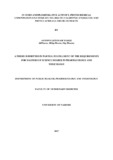n Vitro Antiploriferative Activity, Phytochemical Composition and Toxicity Studies of Fagaropsis Angolensis and Prunus Africana Crude Extracts
Abstract
Antiproliferative and Cytotoxicity screening models are the preliminary methods for selection of active plant extracts against cancer. Fagaropsis angolensis (FA) and Prunus africana (PA) have wide ranging ethno medicinal uses in Kenya. The study aimed at evaluating the in vitro antiploriferative activity against selected cancer cell lines, in vivo acute toxicity studies and phytochemical constituents of crude of Fagaropsis angolensis (FA) and Prunus africana (PA).
Water and methanol extracts of different plant parts of FA (leaf, leaf stalk, root bark, root stem and whole root) and PA (Bark) were prepared. Qualitative phytochemical screening was carried out on the extracts to identify compounds of pharmacological value. In-vitro growth inhibition capacity of the plant extracts (water and methanol) were evaluated in vero E6 (normal cell), Hep2 (throat cancer) and CT 26-CL 25 (colon cancer) cell lines using the 3-(4, 5-dimethylthiazol-2-yl)-2, 5-diphenyltetrazolium (MTT) cell proliferation assayat the following concentrations 0.14, 0.4, 1.24, 3.7, 11.11, 33.33 and 100μg/ml. Cell viability was calculated and dose response curves plotted to determine the effective concentration of the extracts in inhibiting 50% cell proliferation (IC50) against doxorubicin (standard anti-cancer agent). The acute oral toxicity was investigated in 8-12 weeks old healthy female Swiss albino mice using the Organization for Economic Cooperation and Development guidelines number 423, of 2001.
The following phytochemicals were present: alkaloids, flavonoids, glycosides, phenols, tannins, saponins and steroids. It was established that the methanol root stem and whole root extracts of FA had IC50 values of 1.10±0.70 μg/ml and 5.10±0.80μg/ml respectively on vero cells which was significantly (p>0.05) lower than 6.5±3.25μg/ml of doxorubicin. Further, the methanol root stem and whole root extracts of FA had IC50 values of 8.33±1.42 μg/ml and 5.25±0.35μg/ml on colon cancer cell lines which was significantly (p>0.05) lower than
xv
19.00±9.00 μg/ml of doxorubicin. The IC50 values of the aqueous and methanol extracts of FA on normal (vero, E6) cell lines was; bark (5.56± 1.5μg/ml, >100μg/ml), respectively compared to (6.5±3.25μg/ml) of doxorubicin (standard anti-cancer agent). On throat cancer (HeP2) cell lines, the IC50 values of the aqueous and methanol extracts of FA was; bark (18.15±17.85μg/ml, 11.75±2.75μg/ml), respectively compared to 2.5±0.50μg/ml doxorubicin (standard anti-cancer agent). With regard to the CT26 cell lines, the IC50 values of the aqueous and methanol extracts of FA was; bark (31.00±21.00μg/ml, 67.50±21.50μg/ml), respectively compared to 19.00±9.00μg/ml of doxorubicin (standard anti-cancer agent). No signs of toxicity or mortality were observed over the test period (LD50 >2000 mg/Kg) acute oral toxicity study.
The results of this study suggest that different plant parts of FA and PA have promising anti-cancer activity in vitro. Moreover, from the IC50 values of methanolic root stem and whole root extracts of Fagaropsis angolensis had the best in vitro antiploriferative activity. The results of this study justify further investigation of crude methanol extracts of Fagaropsis angolensis and crude water extracts of Prunus africana as a potential source of anticancer agents. However, further investigations are needed to evaluate the safety and efficacy of the crude extracts of these plants in vivo to support their ongoing ethno botanical use in traditional cancer therapy.
Publisher
University of Nairobi
Rights
Attribution-NonCommercial-NoDerivs 3.0 United StatesUsage Rights
http://creativecommons.org/licenses/by-nc-nd/3.0/us/Collections
The following license files are associated with this item:


